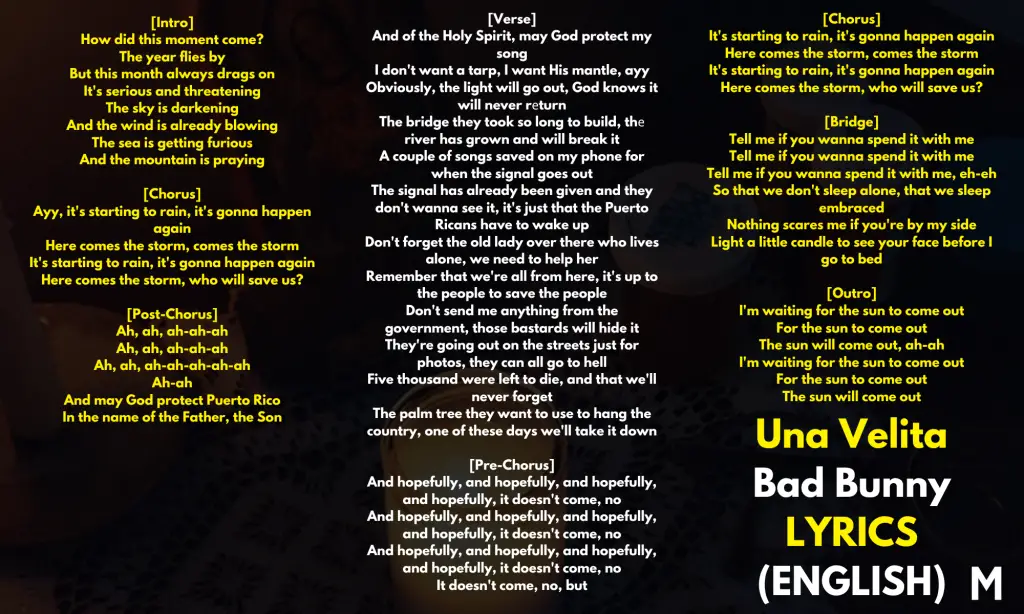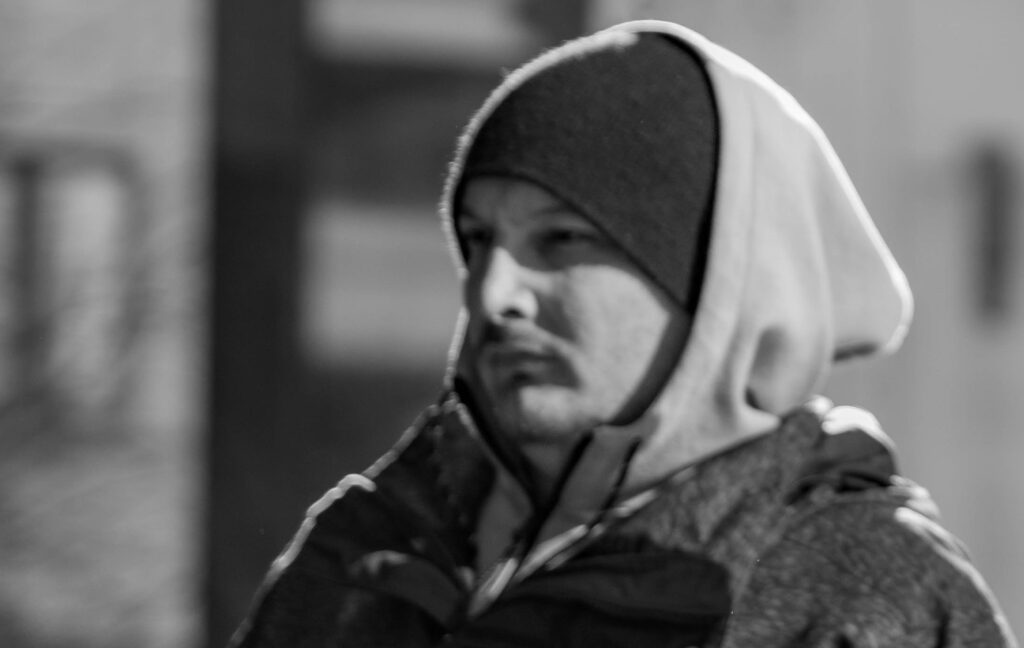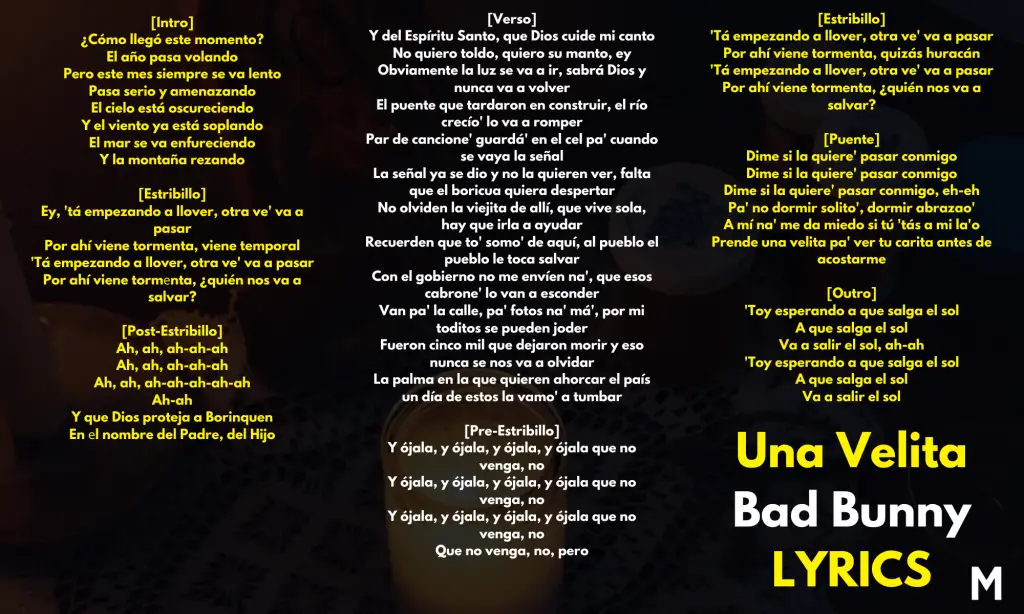Table of Contents
Bad Bunny’s “Una Velita” hits immediately as a track built on layers of emotion and history. Released on the seventh anniversary of Hurricane Maria, it taps into the shared trauma still felt across Puerto Rico. The song resonates hard with anyone who experienced that disaster firsthand, but even beyond that, there’s something universal about it.
As someone with a background in English Literature from the University of Oregon, I’ve always been drawn to how music and poetry connect. I spend a lot of time unpacking song themes, especially when they reflect experiences beyond the surface level. “Una Velita” brings to mind literary works that deal with similar themes of nature, destruction, and the emotional toll of living through disaster. Think Yeats, Shelley, or even McKay—poets who explored chaos, powerlessness, and renewal. This analysis is just my own interpretation based on a close reading of the lyrics. Still, there’s no doubt that Bad Bunny, with the help of producers Tainy and La Paciencia, is building on these timeless ideas.
In this breakdown, I’ll explain how the song reflects on the storm, the failures of the government response, and the deep-seated need for faith and community. I will admit that much of my close reading is going off the translation, which loses much of the nuance in a charges piece like this, but for the solitary English speakers out there, I hope the close reading of the transcription is enough to catch the beat, vibe, and message.
Bad Bunny Una Velita Lyrics (W/ Translation)

Bad Bunny Una Velita Meaning
The opening lines of this song—
“How did this moment come?
The year flies by
But this month always drags on”—
Immediately set the stage for something looming, something that’s arrived almost without the singer realizing it. This is a moment of reflection, almost confusion. It reminds me of the way time slows down when we’re anticipating something inevitable, yet terrifying. What’s clear is the sense of dread here, and that really connects to how W.B. Yeats portrays that same feeling of inevitability in “The Second Coming”.
Yeats writes about the chaotic approach of an event that’s beyond human control—“Things fall apart; the centre cannot hold.” In both the song and the poem, there’s a moment of realization: things are spiraling, but you’re powerless to stop it. That’s the core emotion here.
The following imagery—“The sky is darkening / And the wind is already blowing”—is pretty straightforward in setting the scene, but it’s effective. You know a storm’s coming; you feel it. This reminds me of Shelley’s “Ode to the West Wind,” which focuses on the wind as this force of nature that can’t be reasoned with or controlled. Shelley describes how the wind brings both destruction and, eventually, rebirth.
In this song, though, the focus is much more on the destructive side, and the tension keeps building.
But what really grabs me is the personification that comes next…
“The sea is getting furious
And the mountain is praying”
Now, this is where we see something deeper. The sea becoming furious? That’s nature completely out of control. But then the mountain—something we usually see as solid and unmovable—starts praying. There’s something almost ironic in this. The mountain, which represents stability, is so overwhelmed by the storm that it turns to a higher power. It’s a great way to show how even the strongest forces we know (in nature or in life) can be brought to their knees.
This ties back to what poets like John Donne grappled with—how faith intersects with moments of crisis. We see this same kind of helplessness in Donne’s “Holy Sonnets,” where even the most stable things in life (like life itself) can be upended, forcing a turn toward God.
Chorus: Cyclical Disasters and Powerlessness
The chorus is where this sense of powerlessness really locks in:
“It’s starting to rain, it’s gonna happen again
Here comes the storm, comes the storm
It’s starting to rain, it’s gonna happen again
Here comes the storm, who will save us?”
Here, the repetition is key. “It’s gonna happen again” feels like the punchline to every verse. The idea that this isn’t a one-off disaster but something that happens again and again. For Puerto Rico, where hurricanes like Maria have devastated the island repeatedly, this feels like a reflection of real trauma. The storm isn’t just literal; it’s symbolic of the recurring hardships—both natural and man-made—that keep hitting the island.
This repetition connects well with Yeats’ idea of cycles in “The Second Coming”.
His poem speaks of history moving in a kind of spiral, where chaos and destruction inevitably return. Similarly, in this song, the storm is a recurring nightmare that the speaker can’t escape. And then you have that question hanging at the end—“Who will save us?” It’s an open question, and the lack of an answer underscores the sense of helplessness. Who will save us? The government? God? No clear answer is given, and that uncertainty is what lingers.
Post-Chorus: Turning to Faith
The post-chorus introduces faith directly:
“And may God protect Puerto Rico
In the name of the Father, the Son”
This is an important shift.
When you’re facing something as unstoppable as a hurricane, where else can you turn but to a higher power? The song moves from describing the storm to asking for divine protection. This kind of reliance on faith in moments of crisis has a long tradition in poetry. For instance, John Donne, in his “Holy Sonnets,” constantly grapples with the idea of mortality and salvation. In “Sonnet 14,” Donne famously asks God to batter his heart—showing how even when we feel utterly helpless, faith is a way of making sense of things, or at least surviving them.
In this song, there’s a similar plea. The singer turns to God for protection—not just for themselves, but for the whole island. The reference to the Father and the Son places this in a distinctly Christian framework, which makes sense given the religious background in much of Puerto Rican culture. This isn’t just a personal cry; it’s about saving an entire community, a whole way of life.
Verse: Government Failure and the Need for Self-Reliance
Then we get to the verse, where the song takes a sharp turn toward political commentary:
“I don’t want a tarp, I want His mantle, ayy
Obviously, the light will go out, God knows it will never return”
This is where the song’s critique of the government really takes shape. The line about not wanting a tarp but instead wanting God’s mantle? That’s powerful. It’s a rejection of the bare minimum—those blue tarps that were handed out after Hurricane Maria, symbolizing the government’s half-hearted response. The singer is looking for something much deeper, something that actually protects and endures, not just temporary fixes.
Then there’s the matter-of-fact statement that “the light will go out”.
It refers to the constant blackouts in Puerto Rico after the hurricanes, but I think it’s also symbolic. The light going out feels like the loss of hope or stability. The bluntness of “God knows it will never return” is what hits hardest. It’s an acknowledgment that the infrastructure is so broken that people can’t even count on something as basic as electricity to come back. This line reminds me of McKay’s “If We Must Die,” where there’s a refusal to accept the injustice, but here, instead of a rallying cry, it’s almost resigned.
The next lines go further into frustration…
“Don’t send me anything from the government, those bastards will hide it
They’re going out on the streets just for photos, they can all go to hell”
This is direct anger.
There’s no sugar-coating it. The speaker feels that the government’s response is performative, offering aid for the cameras but doing little behind the scenes. This mirrors the sentiments we saw after Hurricane Maria, where many felt abandoned by both local and federal governments. What I find interesting is how the song’s tone changes here from the earlier spiritual plea to something much more grounded in social reality. The speaker isn’t just asking for help anymore—they’re rejecting fake solutions.
This reminds me of how in literature, writers like McKay and Langston Hughes often criticized the systems of power that ignored or oppressed communities. In McKay’s “If We Must Die,” the call is for solidarity and defiance. The same idea runs through this verse—the people of Puerto Rico can’t count on the government to save them. It’s up to them.
Pre-Chorus: Fragile Hope
Then we hit the pre-chorus:
“And hopefully, and hopefully, it doesn’t come, no
It doesn’t come, no, but…”
This part is interesting because it’s where we see hope, but it’s so fragile. The repetition of “hopefully” feels like a desperate wish, but the line cuts off with “but…” It’s like the speaker can’t even finish the thought, because deep down they know the storm is coming, whether they want it to or not. This reminds me of how Shelley’s “Ode to the West Wind” balances destruction and renewal. There’s always that hope for spring after the devastation, but the devastation is inevitable first.
Here, the song holds onto hope, but it feels almost half-hearted, like the speaker doesn’t truly believe it.
Bridge: Human Connection as a Shield
The bridge is where things get more personal:
“Tell me if you wanna spend it with me
So that we don’t sleep alone, that we sleep embraced”
I think this is a moment where the speaker is looking for comfort in human connection. There’s a lot of fear in the song—fear of the storm, fear of being abandoned—and here, the answer isn’t just faith, but the presence of another person. In literature, we often see this need for companionship in moments of crisis. John Donne explored this in poems like “The Good-Morrow,” where love becomes a kind of shelter from the chaos of the outside world.
In the song, the idea of sleeping embraced suggests that even when everything else is falling apart, being with someone can offer a sense of safety, however temporary it may be.
Outro: Waiting for the Sun
Finally, the song ends on this note:
“I’m waiting for the sun to come out
The sun will come out”
This is a moment of hope. After all the anger, the fear, and the helplessness, the speaker is still waiting for the sun. It’s a simple image, but it’s powerful. The sun coming out is a symbol of renewal, of recovery after the storm. It reminds me of the closing line of Shelley’s “Ode to the West Wind”—“If Winter comes, can Spring be far behind?” After all the destruction, there’s always a sense that something new can begin.
Even though the song acknowledges the recurring nature of the storm, there’s still a belief that it won’t last forever.
The post Bad Bunny Una Velita Lyrics And Meaning: Translating Faith, Fear, And Frustration appeared first on Magnetic Magazine.






